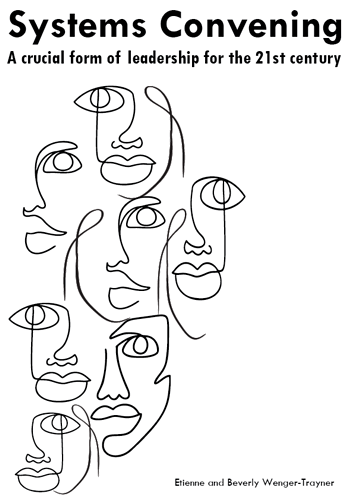Given that Etienne Wenger’s original research coming out of the Institute for Research on Learning at Xerox popularized Communities of Practice (mind the subtitle of Learning, Meaning and Identity), I can’t say that I’m surprised at the continuing development of their work.
The focus is on the leadership of the community, the convenors.
The essence of systems convening: a theoretical model
We call them systems conveners, but most of them do not have a background
in systems theory and practice. What they have in common is a certain mindset,
which we articulate as a combination of four dimensions:
- They are driven by a restless determination to make a difference that
is meaningful to all involved across boundaries and levels of scale. As a
result, they are ready to take on a challenge in its full social complexity.- They proceed from a keen awareness of the social landscape and its
complex texture of lived practices, formal systems, and personal
relationships—with the various perspectives and boundaries this entails.
For them, challenges are always embedded in that landscape. Rather
than bring about change from above or outside, they see the need to
work the landscape from a place within it. They combine a high-level
landscape view with an appreciation for the lived experience in each
location in that landscape.- They work with people. They place a premium on finding meaningful
ways to involve people in the work. They avoid perfunctory participation
but encourage people to act on their perspectives and take initiative.
Developing this kind of agency while crossing boundaries is complex. It
challenges existing identities. It requires commitment and the ability to
navigate personal relationships and demands for accountability. It is hard
work, but they see the transformative potential and they take it on.- They adopt a social learning approach. Systems conveners are driven
by a vision of what is possible, but they do not come to a situation with
predefined answers. Rather than driving a specific change, we see them
developing what we call social learning capability. By convening new
learning partnerships, they believe that people will develop the ability to
make a difference—by interacting with each other, learning about each
other’s perspectives, finding common ground or respecting differences.
This social learning approach means that systems conveners work with
people where they are and take them along on a joint learning journey.
The book has been made available on a CC-BY-NC license.
Wenger-Trayner, Etienne, and Beverly Wenger-Trayner. 2021. Systems Convening: A Crucial Form of Leadership for the 21st Century. Social Learning Lab. https://wenger-trayner.com/systems-convening/.

